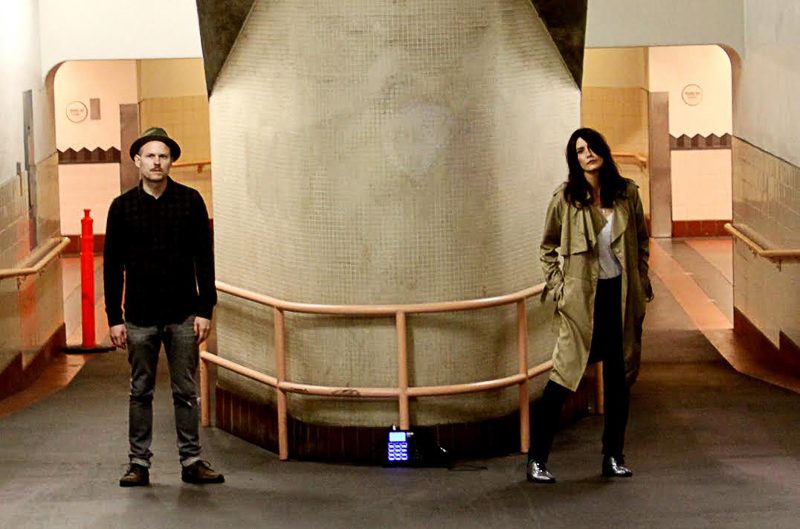FAULT Magazine in Conversation with Rainbow Arabia
RAINBOW ARABIA: A (POP) LABOR OF LOVE
For more than a year and a half, Tiffany and Danny Preston, the duo behind LA-based electronic band Rainbow Arabia, worked tirelessly to create the follow-up LP to their 2013 album FM Sushi to no avail. Though prolific in their production of tracks, what the creative team’s musical efforts ultimately lacked was thematic cohesion.
The problem, according to Danny, was that the band’s earlier experimentation with a more techno-based sound consistently lead to dead ends.
“We were experimenting with but it didn’t really work vocals that well, or it didn’t have enough melody,” says Danny. “So we’re trying something new but it wasn’t really working.”
Rainbow Arabia eventually enlisted the services of Matt Boynton, the Brooklyn-based audio mixing veteran who has counted acts as diverse as Norah Jones and Sonic Youth as clients.
“We both made the decision that this record wasn’t going to get done unless we made an appointment with Matt Boyton,“ says Tiffany.
Almost immediately, all the disjointed parts of Rainbow Arabia’s vast-but- unreleased body of work began to piece together. Under Boynton’s wing, Rainbow Arabia was finally able to accomplish in two months what they’d struggled to do for almost two years. The end product, LA Heartbreak, is perhaps Rainbow Arabia’s most revealing album yet. Aesthetically, Danny’s complex musical arrangements propel the band further away from the world music-inspired sounds of past albums, and closer to the 80s synth-pop, metal and punk influences of their youth. Lyrically, Tiffany brutally honest vocals expose some of the more emotionally trying moments in the duo’s marriage and creative partnership in a way unparalleled in previous LPs.
Following the official release of LA Heartbreak this past November, Rainbow Arabia will debut their new material to audiences in Los Angeles and the Pacific Northwest before eventually moving further out on the road in 2017. The pair recently took the time to chat about creating LA Heartbreak and the challenges of being a couple act.
FAULT: To what extent is LA Heartbreak autobiographical?
TIFFANY: You know, it was interesting because in our lives we’d been sort of dealing with a lot of stuff in our relationship. There was a time when we were trying to have a baby, hence the baby bottle on the cover. Things just weren’t working out for us. I feel like, mentally, we were kind of in a really dark place when I was writing it, so the lyrics kind of just came out. I really improvised a lot of my lyrics.
Through making the record I feel like, when we finished it, it really was a therapeutic thing for me because we were going through couples therapy, too. All of a sudden, as soon as we finished the record everything sort of came together for us in the end. We’re doing much better, but the title LA Heartbreak was kind of a reflection of our relationship and the life struggles that we’re going through at the time.
FAULT: Is it difficult to listen to the album given where it came from and how personal it was for you at the time?
TIFFANY: No. I think that sometimes struggle in life can be a tool to make better music. I think that, you know, that’s just a part of me. It’s very easy for me to kind of tap into and reveal dark parts of myself. So when I listen to it, I’m like, ‘OK that was me then, and it’s fine,’ you know? It’s easier for me to write a sad song than a happy song though for sure.
FAULT: LA Heartbreak seems certainly more personal than your previous albums. Do you expect this to be the direction that the both of you go creatively from now on?
TIFFANY: Kind of. I feel like with both of us it’s so unpredictable. I feel like when we start working on songs it just changes. Every time we have a clear direction on what we want to do, it always comes out different. So, I feel like I can’t predict that.
DANNY: The tone and mood is only going to be about how you’re feeling at the time.
TIFFANY: It is really unpredictable. What I can predict is that I think we both learned a lot from this record about things we want to improve on in our songwriting and vocals — technical things that we want to improve. But I can’t predict the tone of our next record. It’s really a headspace and where you are at that time.
FAULT: So Tiffany, back in 2011, following the release of Boys and Diamonds, you told the L.A. Times how you and Danny actually stopped communicating after you finish that album, which is incredible.
TIFFANY: [chuckles] After every album.
FAULT: Is it difficult beginning a project when you already recognize the kind of pressure it creates for the both of you personally?
TIFFANY: Yea but we we’ve been married for a long time. I’ve seen couple bands go through the same dynamic that Danny and I have.
DANNY: Usually they break up.
TIFFANY: Yea, a couple of them have broken up. But, we’re in a few dynamics. We have a label — we’re label partners. Then we have our band — that’s another dynamic — and then we’re married, that’s another dynamic. So, any sort of pressure or anything that goes on does tend to seep through everything.
But, the one thing that’s gotten better — it’s just like when you’re married for a long time or you’re in a band for a long time. — is that you get through things and then you start to deal with them better. And I feel like, definitely on this record, once we made a deadline and we kind of put our minds to it, we actually got through it pretty good at the end. And when it was finished it was different. It was more relieving and we actually were much more happier when we completed this album.
DANNY: Yea, I think the end project of Boys and Diamonds was more dissatisfying than this record.
FAULT: The influence of world music is much more apparent in your earlier records than it has been more recently, particular since Boys and Diamonds. What inspired that shift?
DANNY: Well, the thing is that our influences and inspiration constantly changes. We both love all kinds of music and get inspired by — I mean, it’s limitless, the music out there.
So I still love world music and there’s still so much more world music. I mean, that’s a huge world to get into. I think just at the time when we started, that’s what pushed us in influence. Our first two EPs — The Basta and Kabukimono — those were very world-influenced.
We have our sound but we’re never going to stay sounding the same because that’s who we are as people. We like to dig in other places and have new inspiration. We’re not closed in a box. We always like to be inspired by news things.
Words: Carolyn Okomo


